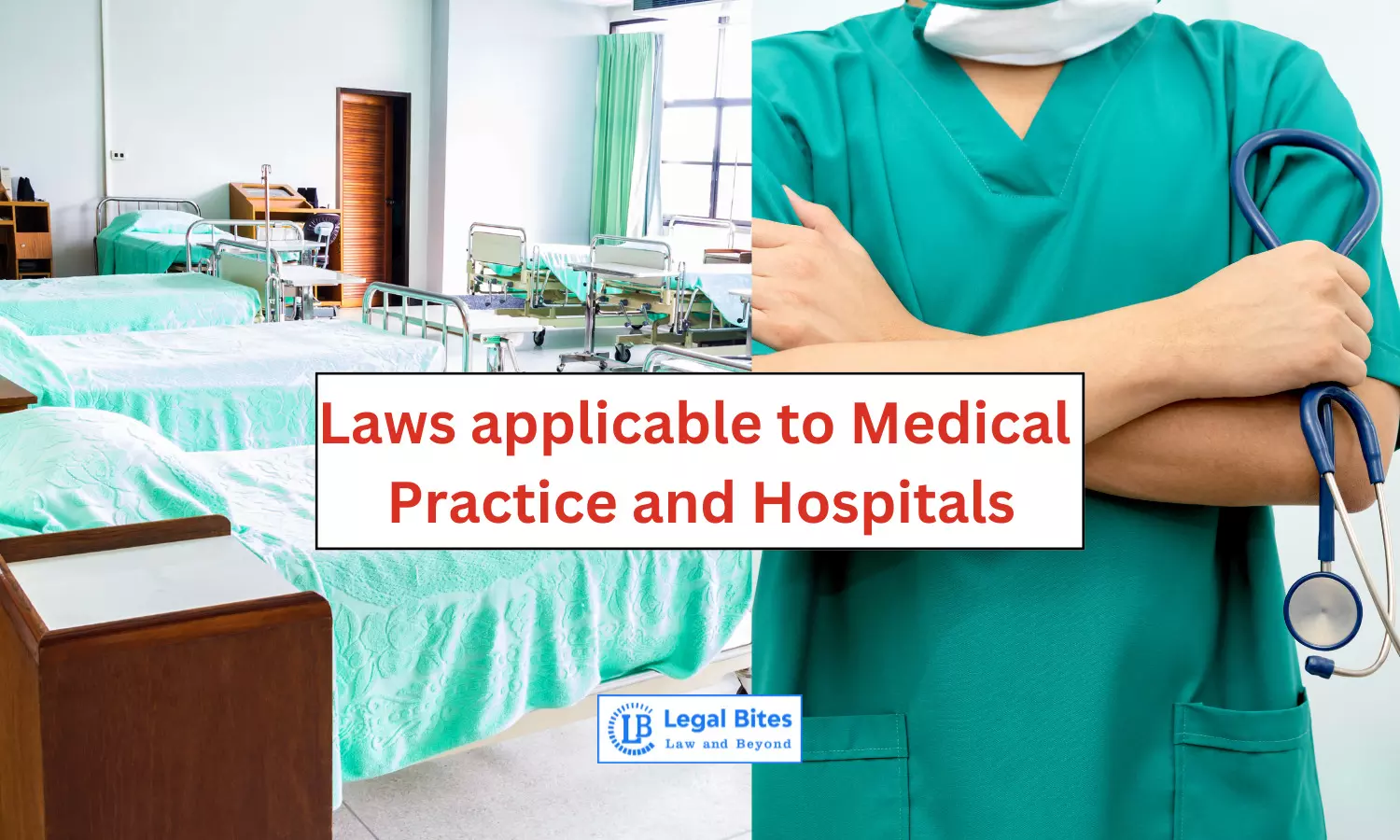Laws applicable to Medical Practice and Hospitals in India
The Article 'Laws Applicable to Medical Practice and Hospitals in India' intends to explore the legal framework with regard to the medical infrastructure and practice in India. It will also retrace the journey of medical laws from the era of pre-independence to post-independence.

The Article 'Laws Applicable to Medical Practice and Hospitals in India' by Snehil Sharma intends to explore the legal framework with regard to the medical infrastructure and practice in India. It will also retrace the journey of medical laws from the era of pre-independence to post-independence.
Human culture is based on honesty, integrity, respect, the quest for excellence, civic responsibility, accountability, and loyalty which are the values that also form the cornerstone of an ethical society. A society, and particularly its medical profession, a public-oriented and noble profession, can only survive and thrive by adhering to and practicing a set of rules of conduct that are guided by ethical, moral, legal, and social values of the land. This has been established through the dawn of civilization by trial and error. The states and territories that makeup India's federal government manage the country's overall healthcare system.
In accordance with the Constitution, each state has been "increasing the quality of nutrition and standard of life of its people and development of public health" as one of its main responsibilities. According to a survey done in Mumbai, eight out of ten doctors believe that India's regulations governing the practice of medicine are outdated, and an even larger majority believe that there are too many laws and licenses needed to maintain their practice. Medical laws are obligations placed on society by the appropriate authority, and breaking them can result in a financial fine, a term in jail, or both.
Medical laws in India
People who choose to practice this holy profession have been subject to particular obligations and responsibilities from the beginning of human history. Charak's Oath (1000 BC) and the Hippocratic Oath serve as examples of this (460 BC). The Kautilya's Arthashastra provides documented proof of the state's engagement and regulatory role. As there are cures for the ailments, Kautilya thought that famine was a greater catastrophe than plague and epidemics, as remedies can be found for the diseases. He believed the king ought to tell the doctor to use medicine to prevent epidemics.
The regulations created by Hammurabi, the legendary king of Babylon, approximately 2000 BC ago, are the earliest known system of laws governing health practices. Hippocrates, a Greek physician, established the Hippocratic oath, the first known code of medical ethics, in the fifth century BC, more than two millennia ago.
The state exhibited an interest in public works, the provision of medical treatment, and making legislation during the Ashoka period (270 BC). He established hospitals throughout his kingdom, paying for medical care out of public funds. Charaka's Samhita contains a detailed description of ethics, and Ayurvedic doctors in ancient India had a clearly established code of medical ethics.
Before 1947 Developments
The colonial power brought their own doctors, surgeons, and barbers. As the treatment gained popularity in England in the middle of the 19th century, it gradually began to have an effect in India as well. Colonial health policies in India were primarily determined after 1857 through their concern for the military and the civilian population of Europe.
The process of establishing a healthcare system required the development of a legal framework for medical professionals. The East India Company provided doctors and surgeons to the country during the early period of administration, and the British Government took over after 1857. British doctors working in India were required to register with the General Medical Council (GMC), established in England in 1857, and were subject to its disciplinary rules. Lawmaking for doctors became necessary as more medical students graduated from Indian medical schools.
In 1912, the Bombay Presidency passed the Bombay Medical Act. Soon after, medical actions were taken in various other provinces. 1914 saw the passing of the Madras Medical Registration Act and the Bengal Medical Act.
The Indian Medical Degree Act, passed by the Indian Legislative Council and endorsed by the Governor General in 1916, came shortly after these provincial laws. After the Indian Medical Council Act of 1933 was passed, the Medical Council of India was established as a statutory national authority for modern medical practitioners. The Bombay Medical Practioner Act, which was passed in 1938, provided the Indian medical systems with their first official legal recognition and registration.
Post-1947 Developments
After gaining independence in 1947, organized healthcare services entered a new phase of development that gave individuals additional rights. Along with that, the state also started passing new laws, amending colonial laws, and developing case law to extend rights and strengthen peoples' rights to health care. The task faced by the country at the time of independence and during the initial planning stages was to build the physical and institutional infrastructure for India's quick development or modernization. With time, the Parliament has approved a significant number of measures and acts to improve India's healthcare system.
Criminal liability in the medical profession
Criminal law seeks to influence people's behaviour in a way that is acceptable to society. It makes a significant effort to uphold the social mortality laws. Criminal law identifies specific behaviours as crimes and specifies how they should be punished. Doctors who fail to perform their duties and commitments or who fall short of their obligations may be held legally responsible and subject to criminal prosecution and punishment. A doctor is subject to criminal law slightly differently than the average individual. This is due to the fact that it permits a doctor to harm a patient in order to prevent more serious harm.
Offences harming life are the most important area of criminal law for a doctor. These crimes primarily involve murder, simple injury, severe injury, and miscarriage or abortion. Any of these offences may be brought against a doctor in general. The criminal law, however, provides a doctor with three powerful defenses, namely: (1) informed permission, (2) necessity, and (3) good faith. A variety of criminal liabilities linked to various sections of the Indian Penal Code, the Code of Criminal Procedure, and several acts like MTP, PCPNDT, Transplantation of Human Organ Act, etc. are associated with medical practice.
Laws applicable to hospitals
There are numerous laws that make sure that hospital facilities are built following the proper registration process, that they are safe for the general public to use, that they have the bare minimum of necessary infrastructure for the anticipated type and volume of workload and that they are periodically inspected to ensure compliance.
The Laws which are applicable to hospitals and their commissioning include the Atomic Energy Act 1962, Delhi Lift Rules 1942, Bombay Lift Act 1939, Draft Delhi Lifts and Escalators Bill 2007, Companies Act 1956, Indian Electricity Rules 1956, Delhi Electricity Regulatory Commission (Grant of consent for captive power plants) Regulations 2002, Delhi Fire Prevention and Fire Safety Act 1986, and Fire Safety Rule 1987, Delhi Nursing Home Registration Act 1953, Electricity Act 1998, Electricity Rules 1956, Indian Telegraph Act 1885, National Building Act 2005, Radiation Protection Certificate from BARC Society Registration Act, Urban Land Act 1976, Indian Boilers Act 1923 and The Clinical Establishment (Registration and Regulation) Bill 2007.
Laws governing to Sale, and Storage of Drugs and Safe Medication
In India, there are many other laws that limit the misuse of dangerous drugs, regulate the sale of drugs through licenses, prevent drug adulteration and provide for punitive action against offenders. These laws also control the usage of drugs, chemicals, blood, and blood products. The following laws and provisions administer the Sale, Storage of Drugs and Safe Medication:
- Blood Bank Regulation Under Drugs and Cosmetics (2nd Amendment) Rules 1999
- Drugs and Cosmetics Act 1940 and Amendment Act 1982
- Excise permit to store the spirit, Central Excise Act 1944
- IPC Section 274 (Adulteration of drugs), Section 275 (Sale of Adulterated drug), Section 276 (Sale of drug as different drug or preparation), Section 284 (negligent conduct with regard to poisonous substances)
- Narcotics and Psychotropic Substances Act
- Pharmacy Act 1948
- Sales of Good Act 1930
- The Drug and Cosmetics Rule 1945
- The Drugs Control Act of 1950
- VAT Act/Central Sales Tax Act 1956
Conclusion
Because it aids in the preservation of life, the medical field is seen as noble. We consider life a gift from God. As a result, a doctor plays a role in God's plan as he prepares to obey his command. The majority of the time, a patient chooses a physician or medical facility based on reputation. Patients have two expectations of doctors and hospitals: first, that they will treat them with the knowledge and competence at their disposal, and second, that they will not in any way injure the patient via staff negligence, carelessness, or recklessness.
When people first entered contemporary human society, they sought a high standard of living. But even the quality of life is influenced by our physical well-being. When compared to the size and issues in the healthcare industry, there are surprisingly few laws governing health. A comprehensive healthcare act must be created in order to align the goals of India's various legislative initiatives with the broader healthcare industry. Most frequently, medical-legal disputes result from violations of these laws and rules. A hospital or doctor would be in compliance with the law if they thoroughly understand and abide by these laws and regulations.
References
[1] Madhav Madhusudan Singh, Uma Shankar Garg & Pankaj Arora, Laws Applicable to Medical Practice and Hospitals in India, Available Here
[2] Ankita Budhiraja, Laws Governing Hospitals in India, Available Here
[3] Vridhi Sharma, Health, Healthcare & Right to Health: questions at national & international level, Available Here
Important Links
Law Library: Notes and Study Material for LLB, LLM, Judiciary, and Entrance Exams

